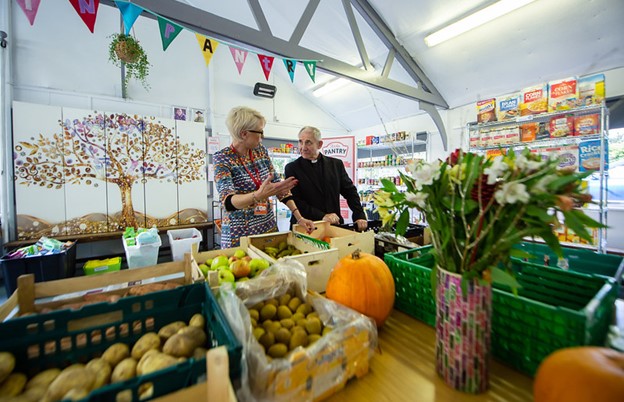The impact of residing in asylum hotels is detrimental to the mental and physical health of those residing there, with a disproportionate impact on children as they are without access to education, to other children their age, and without space to move around freely or to play in.
One of the most common complaints across accommodation sites is the lack of appropriate and nutritious food. The food provided is not suitable for the varied diets of the many people accommodated in any one site nor does it take into consideration their individual delicacies, preferences, or needs. This can be especially detrimental to pregnant women and new mothers, but also for the health and development of children.
Community groups have recognised this need and sought to address it in a manner of ways. One such community group is the Hitchin Pantry, which has deepened community bonds through its extension of support to those residing in asylum accommodation:

Image: Bishop Paul McAleenan (CBCEW) at the Hitchin Pantry with Elizabeth Wills (Caritas Westminster), Credit: CBCEW Flickr
When it was heard that an asylum hotel had opened locally, a call out to the parish of Our Lady Immaculate and St Andrew in Hitchin raised enough money to give anybody who wanted it a membership to ‘Hitchin Pantry’, a community food project which runs twice a week from the parish’s Scout Hut with support from Caritas Westminster.
On Friday and Saturday, when Hitchin Pantry is open to shoppers from across Hitchin, the community comes together in the parish hall over a cup of tea and cake and live music before going into the Scout Hut to do their shopping.
Now on any given day you can find people laughing, chatting, cooking together and sharing meals that have been made with items from the pantry. The parish kitchen has been opened so that people staying in the local asylum hotel can cook fresh and healthy food and request specific ingredients so that they can make recipes from home.
The parish has become a place of mutual support for people who have been placed by the Home Office in local asylum accommodation.
Food experiences of people seeking asylum in London: areas for local action, a report from Sustain’s London Food Poverty Campaign and JRS UK published in March stated “People seeking asylum do not have access to sufficient money, kitchen facilities or food to meet their needs, are provided with food that does not meet food hygiene or nutritional standards, in some cases resulting in hospitalisation” it continues “Experiences of food were broadly experienced as degrading and dehumanising, especially for mothers unable to feed their children adequately.”
This was reflected in conversations Caritas Westminster had with people who attended the Hitchin Pantry Project. One parent said “It feels like we are in jail…the [hotel] food is very bad. My [child] spent every day in hospital because [child] isn’t eating. Sometimes the food is tasteless and sometimes it is too spicy. When we call Migrant Help, they ask us about the food, but they don’t listen.” Somebody else shared that “the food they give us goes to waste.”
In contrast, when asked about positive elements at Hitchin Pantry one parent with a baby on the way said “Friendship between charities and refugees. They are helpful and friendly guys here – we have the kitchen here and free shopping. If it wasn’t here, we would die because we only have £8 to live on. It is not enough for clothes or for preparing for a baby. There is a poster that says the hotel should help provide baby items but then nothing happens.”
Some pantry members have started volunteering at the project. Reflecting on this one person said “I enjoy volunteering at the pantry and kitchen and using what other people throw out. The pantry is very good, and I find very lovely friends. I would like to do other voluntary work.”
Sustain and JRS UK’s report highlighted the Mental Health impact of asylum hotels, lack of adequate food and seeking sanctuary more broadly. One young person shared that the pantry project “helps to relieve from stress. Some of the products have helped by getting the products for free. The community has helped solving an education problem. They encourage me.”
Overnight on Monday 22nd April the Rwanda Bill passed in Parliament. This has been extremely distressing for people who have overcome huge challenges and have come to the UK seeking safety, freedom and hope to build a better future, as well as people who are alongside them. Projects like Hitchin Pantry which bring people together and bridge divides are proof that communities want welcome and encounter.


You must be logged in to post a comment.